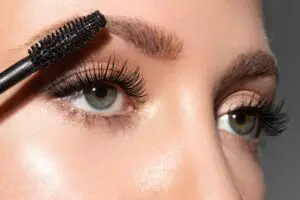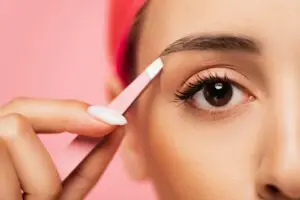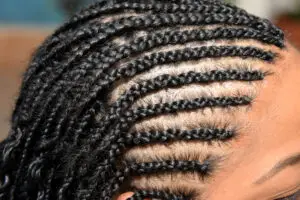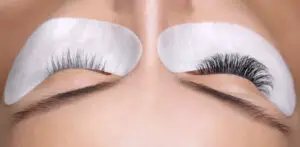Coconut oil is a versatile product that has many uses, including as a makeup primer. Using coconut oil as a primer can be an affordable and effective way to prepare your skin for makeup application.
Coconut oil is known to have moisturizing and nourishing properties that can help to keep your skin looking healthy and glowing. It is also non-comedogenic, which means it won’t clog your pores and cause breakouts.
However, it is important to be cautious when using coconut oil as a primer, especially if you have sensitive skin. Some people may experience irritation or allergic reactions to coconut oil. It is recommended to do a patch test before applying it to your entire face.
Benefits of Using Coconut Oil as a Makeup Primer
Coconut oil is a popular natural alternative to traditional makeup primers. Here are some benefits of using coconut oil as a makeup primer:
- Moisturizes the skin: Coconut oil has moisturizing properties that can help keep the skin hydrated and prevent dryness. This can be especially beneficial for people with dry skin.
- Smooths the skin: Coconut oil can help smooth the skin’s surface, creating a more even base for makeup application. This can help reduce the appearance of fine lines and wrinkles.
- Protects the skin: Coconut oil has antioxidant properties that can help protect the skin from environmental damage, such as pollution and UV rays.
- Reduces inflammation: Coconut oil has anti-inflammatory properties that can help reduce redness and inflammation on the skin, making it a good choice for people with sensitive skin.
Additionally, coconut oil is a natural product, which means it is free from many of the chemicals and additives found in traditional makeup primers. This can be beneficial for people with sensitive skin or those who prefer to use natural products.
However, it is important to note that coconut oil may not be suitable for everyone.
People with oily skin may find that coconut oil exacerbates their skin’s oiliness, while people with acne-prone skin may find that it clogs their pores and causes breakouts.
It is always a good idea to patch test any new product before using it all over your face.
How to Choose the Right Coconut Oil
When it comes to using coconut oil as a makeup primer, it is important to choose the right type of coconut oil. Here are some things to consider when selecting coconut oil for use as a makeup primer:
Unrefined vs. Refined
Unrefined coconut oil is the purest form of coconut oil and is extracted from fresh coconut meat. It is minimally processed and retains its natural scent and flavor.
Refined coconut oil is processed to remove impurities and has a neutral scent and flavor. For use as a makeup primer, unrefined coconut oil is recommended as it is more natural and contains more nutrients.
Organic
Look for organic coconut oil to ensure that it is free from harmful pesticides and chemicals.
Virgin vs. Extra Virgin
Both virgin and extra virgin coconut oil are unrefined and extracted from fresh coconut meat. Extra virgin coconut oil is made from the first press of the coconut meat and is considered to be of higher quality than virgin coconut oil, which is made from subsequent presses.
For use as a makeup primer, either virgin or extra virgin coconut oil can be used.
Cold-Pressed
Cold-pressed coconut oil is extracted without the use of heat, which helps to retain its natural nutrients. Look for cold-pressed coconut oil for use as a makeup primer.
Overall, it is recommended to choose unrefined, organic, virgin or extra virgin, and cold-pressed coconut oil for use as a makeup primer.
By selecting high-quality coconut oil, you can ensure that your skin is receiving the best possible nutrients and benefits.
How to Prepare Your Skin for Coconut Oil Application
Before applying coconut oil as a makeup primer, it is important to properly prepare your skin to ensure the best possible results. Here are some steps to follow:
- Cleanse your face: Use a gentle cleanser to remove any dirt, oil, or makeup from your face. This will help the coconut oil penetrate your skin more effectively.
- Exfoliate: Use a gentle exfoliating scrub to remove any dead skin cells and unclog your pores. This will help the coconut oil absorb into your skin and prevent breakouts.
- Apply toner: Use a toner to balance your skin’s pH levels and prepare it for the coconut oil. This will help the oil absorb better and provide a smoother base for your makeup.
- Moisturize: Apply a light moisturizer to your face to hydrate your skin and prevent any dry patches. Wait a few minutes for the moisturizer to absorb before applying the coconut oil.
It is important to note that coconut oil may not be suitable for all skin types. If you have oily or acne-prone skin, it may clog your pores and cause breakouts.
If you have sensitive skin, it may cause irritation or allergic reactions.
Additionally, it is recommended to use organic, virgin coconut oil that is free from any additives or chemicals. This will ensure that you are getting the purest and most natural form of coconut oil.
How to Apply Coconut Oil as a Makeup Primer
Coconut oil is a versatile beauty product that can be used as a natural makeup primer. Here are the steps to follow when applying coconut oil as a makeup primer:
- Cleanse: Start by cleansing your face with a gentle cleanser to remove any dirt and oil from your skin. Pat your face dry with a clean towel.
- Apply: Take a small amount of coconut oil and warm it up between your fingers. Gently massage the oil onto your face, focusing on the areas where you will be applying makeup. Allow the oil to absorb into your skin for a few minutes before applying makeup.
- Blend: Once the coconut oil has absorbed into your skin, use a makeup sponge or brush to apply your foundation and other makeup products. The coconut oil will help your makeup blend seamlessly into your skin, giving you a flawless finish.
Keep in mind that coconut oil is a natural product and may not work for everyone. It is important to patch test the oil on a small area of your skin before using it as a makeup primer to ensure that you do not have an allergic reaction.
Additionally, those with oily or acne-prone skin may want to avoid using coconut oil as a primer as it can clog pores and exacerbate acne.
Overall, coconut oil can be a great natural alternative to traditional makeup primers. With its moisturizing and skin-loving properties, it can help your makeup stay in place and give you a radiant, healthy glow.
Tips for Using Coconut Oil as a Makeup Primer
Coconut oil is a natural ingredient that can be used as a makeup primer to create a smooth and flawless canvas for your makeup. Here are some tips to help you use coconut oil as a makeup primer:
- Start with a clean face: Before applying coconut oil, make sure your face is clean and free of any dirt or makeup. This will help the coconut oil adhere better to your skin and create a smoother base for your makeup.
- Use a small amount: Coconut oil is very rich and a little goes a long way. Use a small amount, about the size of a pea, and apply it evenly to your face. Too much coconut oil can make your skin look greasy and cause your makeup to slide off.
- Wait a few minutes: After applying coconut oil, wait a few minutes for it to absorb into your skin before applying your makeup. This will help prevent your makeup from sliding off and give you a more natural, dewy finish.
- Use a brush or sponge: To apply your makeup, use a brush or sponge instead of your fingers. This will help create a more even and smooth finish and prevent your makeup from looking cakey.
- Avoid oily areas: If you have oily skin, avoid applying coconut oil to areas that tend to get oily throughout the day, such as your T-zone. Instead, focus on areas that tend to get dry, such as your cheeks and forehead.
Overall, using coconut oil as a makeup primer can be a great way to create a natural, dewy finish for your makeup. Just remember to use a small amount, wait a few minutes for it to absorb, and avoid oily areas if you have oily skin.
Conclusion
Using coconut oil as a makeup primer is a popular beauty trend that has gained traction due to its natural, skin-nourishing benefits. With its moisturising properties, coconut oil can help keep skin hydrated and prevent makeup from settling into fine lines and wrinkles.
However, it’s important to note that coconut oil may not be suitable for everyone. Those with oily or acne-prone skin may find that it clogs their pores and causes breakouts. It’s also important to patch test coconut oil before using it as a primer to ensure that you’re not allergic to it.
If you do decide to use coconut oil as a primer, it’s recommended that you use a small amount and apply it evenly to your face. You can also mix it with other natural ingredients such as aloe vera gel or shea butter to create a customised primer that works for your skin type.
Overall, coconut oil can be a great option for those looking for a natural, affordable alternative to traditional makeup primers. However, it’s important to do your research and make sure that it’s the right choice for your skin before incorporating it into your beauty routine.

I’m Jennifer a beauty and wellness expert. I believe in promoting a sustainable and healthy lifestyle from within. Helping people feel good is my passion; whether it’s teaching yoga or offering skincare advice.







